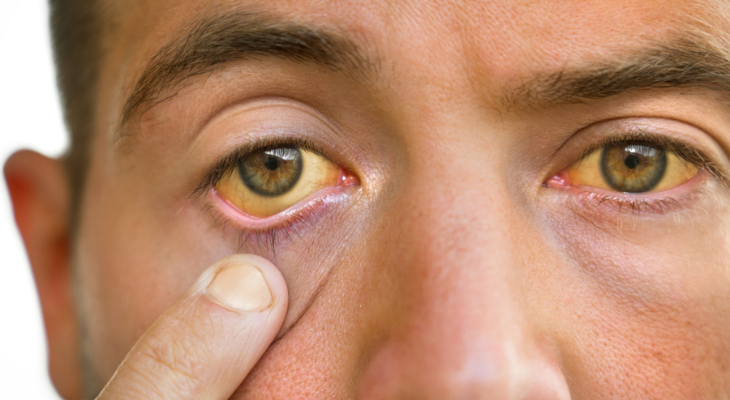
Common Causes of Yellow Eyes
It's only natural to be concerned if you've noticed that the sclera, the white part of your eye, has become yellow. Yellow eyes can be a sign of an underlying health condition and warrant a visit to the optometrist.
What Does the Sclera Do?
The sclera is a tough connective tissue that covers most of the eye. It protects the inner eye from injury and helps your eyeball keep its round shape. Although the sclera is normally white, several diseases and conditions can make it look yellow.
Is Part of Your Sclera Yellow? You May Have a Pinguecula
Pingueculae are yellowish growths on the sclera that can develop if you spend a lot of time outdoors without wearing sunglasses that block ultraviolet (UV) light or are exposed to wind or dust. Although pingueculae are harmless, they can turn into larger growths called pterygia.
Jaundice Could Be to Blame if Your Entire Sclera Is Yellow
Jaundice might be the reason that the whites of your eyes are yellow. The condition affects people of all ages but is particularly common in newborn babies. Jaundice occurs in about 60% of newborns, according to the March of Dimes.
An excess amount of bilirubin causes your eyes to take on a yellow hue if you're jaundiced. Bilirubin is a yellow pigment that forms when old red blood cells are broken down in the liver. The cells then leave the body in your urine and feces. If the liver doesn't do a good job of removing the old cells or removes them too slowly, your eyes may appear yellow due to the bilirubin buildup.
Common jaundice causes include:
- Gallstones. Gallstones form when bile, a digestive fluid, hardens into stones. Bile is made by the liver and stored in the gallbladder. If the gallstones block the bile ducts between the liver and gallbladder, bilirubin collects in your bloodstream and may eventually turn the whites of your eyes yellow. Gallstones that move into the bile ducts are called bile duct stones. These stones were responsible for 92% of jaundice cases in a study of adults 45 and older with jaundice, according to a cohort study published in Family Practice.
- Hepatitis. Hepatitis inflames the liver, making it harder for the organ to do its job. The infection can occur if you've been infected by the hepatitis A, B, or C virus, but can also happen due to heavy alcohol use, toxins, or use of some medications, like steroids or penicillin.
- Parasites. It's not a pleasant thought, but an invasion of parasites could be responsible for the change in your appearance. Jaundice can occur if roundworms block your bile ducts or liver flukes.
- Cirrhosis. Alcohol-associated cirrhosis or non-alcoholic fatty liver disease could kill cells in your liver and replace them with scar tissue, affecting the normal function of the liver.
- Birth Defects. Some people develop jaundice due to a birth defect or condition that affects the body's ability to break down bilirubin. Diseases that can increase the risk of jaundice include Dubin-Johnson syndrome, Crigler-Najjar syndrome and Gilbert Syndrome.
- Pregnancy. In some cases, pregnancy hormones can slow bile flow in the gallbladder and cause jaundice.
- Cancer. A cancerous tumor in the liver, pancreas, gallbladder, or bile ducts may interfere with the normal flow of bile, causing bilirubin to accumulate in your bloodstream.
- Other Causes. Yellow eyes due to jaundice can also occur if you have malaria, hemolytic anemia, an autoimmune disorder, or pancreatitis.
What Are the Treatments for Yellow Eyes?
Treatments for yellow eyes vary depending on the cause. Pingueculae or pterygia usually aren't removed unless they interfere with vision or are unsightly. Newborns with jaundice are treated with special lights that help their bodies break down and remove excess bilirubin. Jaundice is usually a temporary problem that improves as the baby's liver becomes more adept at processing blood cells.
If your optometrist suspects that your yellow eyes are related to jaundice, you'll be referred to a general practitioner. Treating underlying conditions, like hepatitis, gallstones, pancreatitis, anemia, or parasites, can return your eyes to their normal color. Blood tests or other types of tests, like computed tomography (CT) or magnetic resonance imaging (MRI) will help your doctor determine the cause of your yellow eyes.
Are you worried about a change in the appearance of your eyes? Contact our office to schedule an appointment with the optometrist.
Sources:
March of Dimes: Newborn Jaundice, 1/2024
https://www.marchofdimes.org/find-support/topics/planning-baby/newborn-jaundice
Family Practice: Jaundice in Primary Care: a Cohort Study of Adults Aged >45 Years Using Electronic Medical Records, 8/2012
https://academic.oup.com/fampra/article/29/4/416/493323
American Academy of Ophthalmology: Why Are the Whites of My Eyes Discolored, 3/9/2022
https://www.aao.org/eye-health/tips-prevention/discolored-sclera-whites-of-my-eyes-turn-yellow
WebMD: Yellow Eyes, 5/11/2022
https://www.webmd.com/a-to-z-guides/causes-of-yellow-eyes
Merck Manual: Jaundice in Adults, 1/2023

